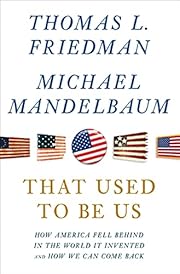

Click on a thumbnail to go to Google Books.
|
Loading... That Used to Be Us: How America Fell Behind in the World It Invented and How We Can Come Back (2011)by Thomas L. Friedman, Michael Mandelbaum
 None No current Talk conversations about this book. Friedman and Mandelbaum produced a thought-provoking book about many of the ills facing America, and some insights as to how these problems could be corrected. Major topics included our Educational System, Energy, technology, climate change, budget deficit, and globalization. Our Educations system was explored in some detail, and I enjoyed some of the improvements made in Colorado, and how the Teachers Union partnered in those ideas. The authors also took issue with our current political paralysis, and found much to fault with both major Parties. I suspect that if one was keeping track, they were slightly more critical of the GOP than the Dem's, but since neither party was supported, it really shouldn't matter. I found their discussion on the value of a Third Party Candidate very interesting. Like many, I had considered a vote for a third party candidate to be a wasted vote, but the book provides examples of how unsuccessful third party candidates from the past, from Teddy Roosevelt at the beginning to Ross Perot at the end of the 20th Century, actually were able to influence the policies of the major parties, even in losing their elections. This book took me a while to read because I would become frustrated as I read, put down the book, and not come back to it for some time. Friedman, who wrote "The World Is Flat," addresses a number of key issues in regards to America's leadership in the world, and how other countries have latched on to the ideals and standards which we projected but have now fallen away from. I appreciate Friedman's emphasis on education, since I work in a college and see many of the problems that he describes. Friedman discusses the false image that many Americans hold regarding American policy, politics, education, and technology, and refutes them with citations of studies, comparisons, and reports. Certainly not a pleasant read, but one worth examining. I first became aware of Thomas Friedman when a New York Times article he wrote came on my google news feed for anything with the title of my book. The novel I'm currently writing is called 'None of the Above', about an unconventional president. I saw a three page article that felt like a synopsis of my book, saying Thomas Friedman's choice for president is None of the Above. So I researched the author and found this book. It was weird/exhilarating to read a book with so many of the same thoughts I've had over the last few decades. I've been in tech for 20 years, so I've been familiar with the effects of globalization and hyper connectivity first hand. One of the things I did learn about was some of the historical context back in the 70s for some of the issues we face today. The book laid out the historical formula for American success in clear terms. I highly recommend the book. It's not too late to salvage our country, but we're definitely on a downward slope. no reviews | add a review
AwardsDistinctions
Makes recommendations for meeting four major challenges currently facing the United States, including globalization, the information technology revolution, chronic deficits, and unbalanced energy consumption. No library descriptions found. |
Current DiscussionsNonePopular covers
 Google Books — Loading... Google Books — Loading...GenresMelvil Decimal System (DDC)973.932History & geography History of North America United States 1901- 2001- Barack ObamaLC ClassificationRatingAverage: (3.72) (3.72)
Is this you?Become a LibraryThing Author. |
||||||||||||||||||||||||||||||||||||||||||||||||||||||||||||||||||||||||||||||||||||||||||||||||||||||||||||||||||||||||
Friedman and co-author Michael Mandelbaum identified the formula for America's success to consist of five items. Education, Infrastructure, Immigration, Research and Development and Regulations are the way we became great. Those five elements have been neglected and we have declined.
The authors stated that the USA's problems are the fault of both major political parties. That is the one part of this otherwise excellent book that I just don't buy. Perhaps because I am a committed member of the Democratic Party but I think I am more objective than that. Of the five elements of America's success it has been the other political party that has failed to support or even actively opposed funding our 5 pillars of success.
This is a well thought out book that still address the current situation even though some elements have changed.
(